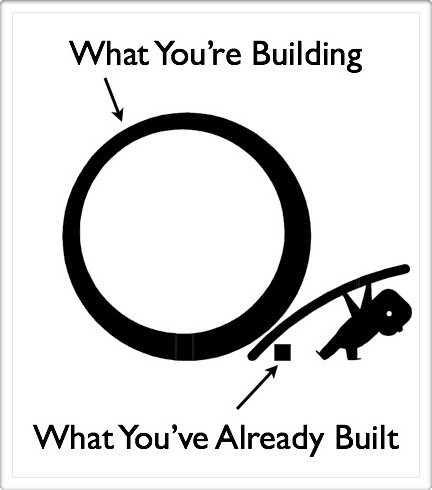Is your thought leadership strategy as solid as a rock? Let's get real—having a strategy…
Leveraging Your Book and Platform Strategically
Everybody is doing it. With easy-to-use, off-the-shelf publishing software, even producing a good looking book isn’t that difficult. Books are being written and published at the highest rate in history.
It’s selling books that is the problem. Many authors write a book and simply expect the sales of the book to propel them towards riches and financial success. But alas, Oprah is no longer on the air, and even getting a spot on The Today Show isn’t easy. In fact, the one shot grand slam strategy is pretty much the highest probability way of striking out at your first and only chance at bat. Most books published today don’t make money at all. But many authors make a lot of money, using the book as a component of a solid platform.
So what is an author to do? Very simply, you must go beyond the book.
To be successful with a book today means that you have to leverage certain specific business concepts and leadership content in a transformative fashion. I looked over the strategies that our best and most financially successful authors and thought leaders adopted to build their platforms this past year. The book is just one component to success.
The strategies identified clearly reveal that if you approach your publishing and marketing with a can-do attitude and adopt new methods with multiple income streams to reach the right target audience with refreshing value-added content and services, you will maximize what you get out of your time, efforts and investment.
1) Target Your Media and Your Market Carefully
The best way to start is to develop a targeted and focused outreach strategy to reach your target market and the media that serve them.
Step 1 — Define your Target Market— Who is your book really designed to help, serve or entertain? Create at least two or three different personas describing the age, sex, education, location, income level, work focus, role, title, job function, social groups and orientation of the people who make up your target market(s).
Step 2 – Determine where they “hang out” both online and offline—what blogs are they reading? What other authors do they follow? What trade magazines are they reading? What associations or industry groups are they members of? What do they do to reach their people?
Step 3 – Value-added Outreach—Deliver content that is of value to these people. Feel their pain. Champion their cause. Fulfill their highest desires. It could be with excerpts from your book, tools, articles, videos, or it could be fresh new material that is simply from you.
It’s easier to find 100 blogs that your target market is following and get 70 of them to run your content than it is to try like crazy to get on The Today Show. A single problem solving tips article or a feature story in the right magazine, or trade journal may be worth much more than a short talking head interview on the major networks. You will be more effective to offer value-added content to the right media every time.
2) Develop and Leverage Testimonials
The value of a single testimonial (be it from a fellow author, business person, or an academic or professional colleague well known blogger, columnist, etc.) is significant. It helps convert browsers into a buyers. The trusted evaluation and endorsement bestowed sways someone that is on the fence to move from browsing to buying. However, you need more than just a few testimonials.
Tremendous leverage comes having a dozen really great testimonials. It’s important that the people you get to endorse your book have a following much greater than yours. The action plan you develop and implement getting these testimonials can be designed and deployed so that the person who endorses you helps spread the word to their followers. For example 10 authors that have a following of 100,000 people each is a million targeted people with a much higher propensity of buying your book. This way, each testimonial becomes an endorsement that is directed to an audience that has the same circulation as many of the top targeted media you might seek coverage in. To do this you must think ahead and plan to do much, even all, of the work for them—meaning you have to create a variety of collateral, properly formatted communications for them to use (tweets, announcements about the book, press releases, videos etc etc). Be disciplined in asking them when to spread the word about your book and always, always offer to do the same for them.
3) Give Plenty of Books Away – But Only to the Right People!
For most authors and thought leaders the book is just one format that their content exists in (and quite frankly one that usually isn’t that profitable for the author). Be crystal clear about who your target market is. Identify the ways to get those books into those people’s hands. Now think of who can influence them if they were to send them a book. You can send them out with a personal note or ask them if you can send books to them if they would them deliver them to the type of people you are trying to reach.
If you want to get a book to an executive for an endorsement, you don’t send one book to the executive directly. You send two or three or even four books to the executive’s secretary, or executive assistant, asking them to pass it on to the executive. You can yet reach out to your network to see who personally knows the type of people you are trying to reach and offer to send a copy out on their behalf. If you want a speaking engagement with a large company, or organization, you don’t send one book to the president. You send a dozen books to the Presidents Executive Assistant with a request to give them to each of the reporting Directors and Vice-Presidents and meeting planners and their staff. Then you follow up with a business proposal to try to close a major deal.
Comments (16)
Comments are closed.






Hello Peter,
I just recently finished up a guide for my blog readers. I have to admit that was the easiest step of the process.
The tips provided in this post is a wonderful road map for new published authors. Thank you for sharing gold nuggets of information.
To Your Success,
Stacie Walker
Woman in Leadership – Essential Knowledge for Business Success
Thanks for sharing these wonderful practical tips to succeed in one’s publishing efforts. Targetted marketing achieves better results and saves your time and effort.
Very helpful. Thanks for sharing.
David Marquet
-author Turn the Ship Around!
I really appreciate the recommendation to define and focus on a highly specific target audience. As the author, one assumes that everyone needs your book. They don’t. Much better to focus only on the people who do! Brian Remer – author, “Say It Quick!”
One of the best missives I’ve seen on this topic, Peter, and as you know there are many missives! Platform marketing is at the tip of every writer and marcommie’s tongue these days. More than ever we live in the age of the “Cult of the personality”, the “public figure”, the “pundit, sage, guru, maven and influencer” – all self-made, self-promoted, self-managed and self-sustaining. It is an amazing phenomenon.
There is a hole in the platform from where I sit, however. Or at least an area that has yet to be effectively addressed (most likely it has been effectively addressed and I just haven’t seen it) in the context of platform marketing and DIYism, and that is Literary Fiction. For example:
I would argue that there is nothing post-read that John Irving is trying to sell us. Rather, his intention is to entertain, enlighten, provoke, distract, and otherwise transport us into the world he has created for however long it takes to read the book. And those worlds, (some might call them “platforms”) change with every novel. So while the storyteller may weave a different theme into every narrative, (Irving’s latest is human sexuality, which is a theme he often visits but I would not call it his “platform”), it is not likely that the author will build a platform, at least in the sense that it has been described, to extend the theme into blogs, conference appearances, panel discussions, tweet chats etc. etc.
So where does that leave the storyteller – the author of non-genre literary fiction – in the world of strategic leverage? That’s a topic I would love to see the platform marketing community tackle!
Excellent tips. I would just add, don’t expect every given book to be read. Many executives have only read a fraction of the books sitting on their shelves, and time is gold. This is where a compelling executive summary (WIIFM), testimonials or personal contact can play a major difference.
Hey Peter,
Long time. Really great advice for authors. You did a nice job compiling a palatable 3 step process to generate a plan. I hope all is well.
David C. Cohen – Round Table Companies
Great post, Peter. Thanks for sharing.
Valuable suggestions but not unknown. Based on my experience as a self-published author and on the publishing conferences I attended in the past, the sad truth is that nobody really knows even today what makes a book sell. Let’s admit it. Publishers didn’t know anything about readers and what they think about authors and books before Amazon.com first appeared with the online reviews. PR is only a part of the whole game. You mentioned the Today Show. I saw many authors presenting there but when I checked their book on Amazon.com was ranking at #250,000 or even lower. It seems to me that unless an author is willing to manage a well-coordinated marketing campaign (with a little PR) and also to spend money, the book will sink. Even celebrities do not sell these days. But that’s the magic of it.
Peter,
Great ideas. I’ve just published my first book with AMACOM and will definitely put some of these in use for my promotional strategy. Your points on providing value-added content and multiplying your reach through others with influence are right on target. Thanks for sharing your expertise.
Diana Rivenburgh
Author, “The New Corporate Facts of Life”
Have to agree with your post and the comment. As a follow-up expert and sales trainer, being ready to make it easy for your clients and referral partners to refer to you is key if you want to leverage their contacts. Keep up the insightful posts!
Heidi BK Sloss
Speaker, Author of “Fortune is the the Follow-Up: 5 Power Strategies to Reinvent your Marketing”
It’s an age-old problem. There was someone eons ago who said:
It’s easy to read a book, expect for the tendency to fall asleep. It’s a little harder to write a book. But the hardest thing of all is to sell a book.
As a seasoned writer/marketer, I’d say: follow your intuition, take chances, meet lots of people, try lots of different avenues, but if you can find a way to benefit people, you’ll sell more easily.
My review for James Kaufman’s new novel, The Concealers, followed that principle. See it on Amazon. Amazon just sent me a message that my review had helped a customer.
Peter, I agree with your thinking! Practical and concrete steps offered to help. Great post for aspiring authors (better yet, for authors with aspirations to sell their books!)
Peter,Great article and great ideas, as always. Kind regards Ricardo
Dear Peter, I have written and published over twenty books on business with a dozen different publishers over the past thirty years. I now live in a very nice house overlooking the Pacific Ocean with no mortgage, thanks to the book businesses. And while I endorse all of your points as being accurate, the real problem is the the book publishing business has changed hugely in past few years. First of all, all the major publishers fired all of their sub-editors, i.e., the do-dos who read manuscripts, and now will only accept manuscripts submitted by agents. In turn, agents, who are even lazier, won’t look at manuscripts unless the author has a “platform”, e.g. a radio show, at TV show a magazine or newspaper column, which really means a way for the author to do all the work to sell the book for the agent and the publisher.
As far as I can tell, none of your points address the reality of publishing today.
And hey, don’t even get me started on what Amazon has done to screw authors!!!
I have given away a boat load of books (mostly kindle) at least it feels like a boatload to me. The gifts have resulted in the book being translated into Spanish and Lao. It open the door for a full page newspaper article and a few(very few) positive reviews on Amazon.
Looking back if I had done more of the things you have mentioned my first two years would have been more successful. But the future is still out there.